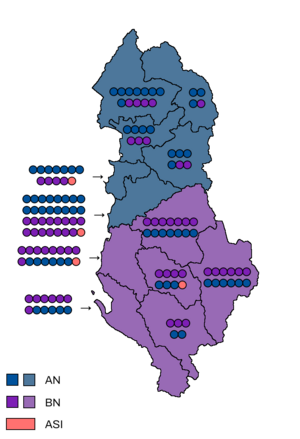
Politics in North Macedonia occur within the framework of a parliamentary representative democratic republic, whereby the Prime Minister is the head of government, and of a multi-party system. Executive power is exercised by the government. Legislative power is vested in both the government and parliament. The Judiciary is independent of the executive and the legislature. The Economist Intelligence Unit rated North Macedonia a "flawed democracy" in 2021.

Sali Ram Berisha is an Albanian conservative politician and former cardiologist who served as the second President of Albania from 1992 to 1997 and Prime Minister from 2005 to 2013.
The Democratic Alliance Party is a liberal political party in Albania. The party was formed in 1992 by Neritan Ceka and other dissidents of the Democratic Party of Albania. They opposed the leadership of the party's leader Sali Berisha.
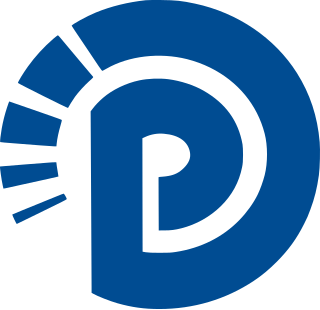
The Democratic Party of Albania is a conservative political party in Albania. It has been the largest opposition party in the country since 2013.
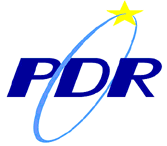
The New Democratic Party was a centre-right, conservative political party in Albania founded in 1999 as a split from the Democratic Party of Albania. It was led by Genc Pollo.

Ilir Rexhep Meta is an Albanian politician. He served as President of Albania from 24 July 2017 to 24 July 2022.

Parliamentary elections were held in Albania on 3 July 2005. The result was a victory for the opposition Democratic Party (PD) and its allies, prominently the Republican Party (PR). Former president Sali Berisha became prime minister as a result of the election.

The Freedom Party, formerly known as the Socialist Movement for Integration, is a social democratic political party in Albania. The party was formed on 6 September 2004, when Ilir Meta defected from the Socialist Party of Albania (PS). A proposal to change its logo, name and other symbols was unanimously approved at the party's National Convention (Congress) on 25 July 2022.
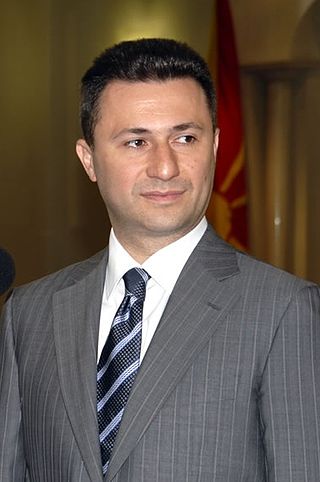
Parliamentary elections were held in Macedonia on 5 July 2006. The result was a victory for the VMRO-DPMNE-led coalition, which won 45 of the 120 seats.
Constitutional Assembly elections were held in the newly-independent Republic of Montenegro on 10 September 2006. Prime Minister Milo Đukanović's Coalition for a European Montenegro won a majority in Parliament, winning 41 of the 81 seats. The opposition blocs together won 34 seats; 12 for the Serb List (SL) and 11 each for the Socialist People's Party (SNP)-led list and the Movement for Changes (PzP). Other seats were won by parties representing national minorities. As the opposition conceded defeat, DPS leader Đukanović stated "These elections showed that Montenegro is stable and firm on its European path."

Parliamentary elections were held in Serbia on 11 May 2008 to elect members of the National Assembly. The election was held barely a year after the previous parliamentary election. There were 6,749,886 eligible electors who were able to vote in 8,682 voting places, as well as 157 special voting stations for refugees from Kosovo.
In 1991, the Socialist Party of Albania, with specific social democratic ideology took control of the country through democratic elections. One year later the Democratic Party of Albania won the new elections. After 1990, Albania has been seeking a closer relationship with the West. What followed were deliberate programs of economic and democratic reform, but Albanian inexperience with capitalism led to the proliferation of pyramid schemes – which were not banned due to the corruption of the government. Chaos in late 1996 to early 1997, as a result of the collapse of these pyramid schemes, alarmed the world and prompted the influx of international peacekeeping forces. In 1995, Albania was accepted into the Council of Europe and requested membership in NATO and is a potential candidate country for accession to the European Union. The workforce of Albania has continued to emigrate to Western countries, especially Greece and Italy.

The 2011 Albanian opposition demonstrations were a series of anti-government protests in cities around Albania following 18 months of political conflict over alleged electoral fraud by the opposition. A video surfaced which portrayed the deputy prime minister arranging a corrupt deal with the minister of economy. The public outcry over the video resulted in the resignation of the deputy prime minister. A demonstration was called by parliamentary opposition parties, which include the Socialist Party and the Unity for Human Rights Party. These were called on 21 January in order to protest the alleged corruption of the Albanian government as well as widespread unemployment and poverty in the country.
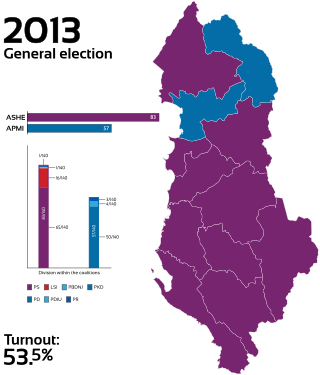
Parliamentary elections were held in Albania on 23 June 2013. The result was a victory for the Alliance for a European Albania led by the Socialist Party and its leader, Edi Rama. Incumbent Prime Minister Sali Berisha of the Democratic Party-led Alliance for Employment, Prosperity and Integration conceded defeat on 26 June, widely viewed as a sign of growing democratic maturity in Albania.
The centre-left coalition is an alliance of political parties in Italy active, under several forms and names, since 1995 when The Olive Tree was formed under the leadership of Romano Prodi. The centre-left coalition has ruled the country for more than 15 years between 1996 and 2022.

Parliamentary elections were held in Albania on 25 June. They had initially been scheduled for 18 June, but after a possible boycott was announced by opposition parties during a political crisis that lasted three months, an agreement was reached between all parties on 18 May to change the date. The Socialist Party won 74 of the 140 seats.

The Twenty-ninth Legislature of Albania, officially known as the VIII Pluralist Legislature of Albania, is the legislature of Albania following the 2013 general election of Members of Parliament (MPs) to the Albanian Parliament. The party of the Prime Minister Edi Rama, PS, with its coalition partners obtained an absolute majority of 83.

Early parliamentary elections were held in North Macedonia on 15 July 2020. It was originally scheduled for November 2020, but Prime Minister Zoran Zaev called early elections after the European Council failed to come to an agreement on starting talks with North Macedonia on joining the European Union in October 2019. The election date was set for 12 April, but was postponed until July due to the COVID-19 pandemic in North Macedonia.

In Albania the Berisha II Government was in office from 2009 to 2013. They were sworn in on 17 September 2009, replacing the Berisha I cabinet, which had been in office since 2005. They were followed by the Rama cabinet on September 15, 2013.
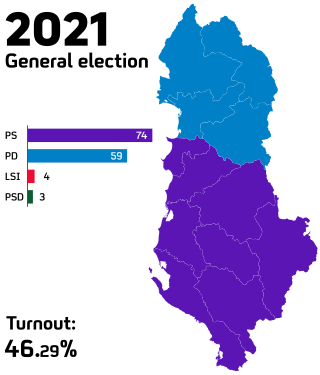
Parliamentary elections were held in Albania on 25 April 2021. It took place during the COVID-19 epidemic.


